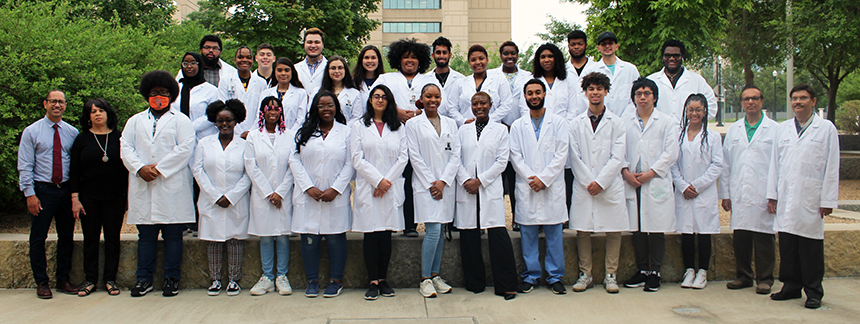Closing the gap: How CDIP works to increase diversity in biomedical sciences
By Gabrielle Saleh
The University of North Texas Health Science Center at Fort Worth’s (HSC) Center for Diversity and International Programs (CDIP) is working to attract more underrepresented minority researchers into biomedical and behavioral sciences fields.
Opening pathways to graduate school for racial and ethnic minority undergraduate students while fostering their love of science are key to building greater diversity in the research sector. That’s why CDIP hosts yearly 10-week, rigorous undergraduate summer research internship programs. These programs let students train in mentor-guided projects as they learn the intricacies of the varied disciplines and methodologies used in biomedical research.
“Diversifying the biomedical science field requires engaging undergraduate students in their area of study,” said Dr. Harlan Jones, CDIP’s director and Associate Professor in the Graduate School of Biomedical Sciences. “Our goal is for our students to complete the programs feeling confident about their future in the field, prepped with practical research knowledge that they can take with them to graduate school and beyond.”
The programs include the Summer Multicultural Advanced Research Training (SMART) program – which is made possible in part by the National Institutes of Health and the National Heart, Lung and Blood Institute – and the Developing Undergraduate Researchers-Matter (DURA-M) program, which is sponsored by the National Institute on Drug Abuse. A new program funded by the Cancer Prevention and Research Institute of Texas (CPRIT) will begin in the summer of 2022.
“HSC has supported summer undergraduate programs for over 35 years through funding from various federal agencies, and we are happy about the long-term partnerships we have with various minority-serving institutions,” said Dr. Jamboor Vishwanatha, Vice President and Regents Professor.
This year, the programs hosted a total of 30 students from more than 20 institutions across the country, several of which are Historically Black Colleges and Universities (HBCUs) and Minority Serving Institutions (MSIs). The programs started on May 11.
Both programs emphasized the value of mentorship, as each student was paired with a faculty mentor who guided them through their research projects and supported their goals.
Taverlyn Shepard, a SMART program student and a junior at Prairie View A&M University, values the connection she built with her mentor over the summer.
“My mentor has been there with me each step of the way and has provided me so much information that I did not know about pursuing a PhD,” said Shepard. “At first, I was kind of iffy about getting a Doctorate of Medicine and of Philosophy, but now I’m really certain that I really want to pursue this because there’s just so many different opportunities.”
As a student in the DURA-M program, Daniel Pina – an incoming senior at Texas State University – focused his research on the immune system. This program allowed him to build upon the material that he has learned in his classes.
“I’ve been able to do a lot more hands-on research than I thought I was going to be able to,” Pina said. “I feel that I’ve learned a lot about the research process and the time that goes into not only doing research but also making sure that you’re efficient.”
The programs culminate with a poster presentation session that showcases their research. The session, which is open to the public, is scheduled for July 14 from 9-11 a.m. in the EAD Atrium. An awards ceremony follows the presentation session from 11:30 a.m.-2 p.m. in the MET, rooms 109-111.
For more information about these summer programs, please contact Pat Baker, Senior Administrative Coordinator for CDIP, via pat.baker@unthsc.edu, or Heather Longtin, Administrative Coordinator for CDIP via heather.longtin@unthsc.edu.







Social media